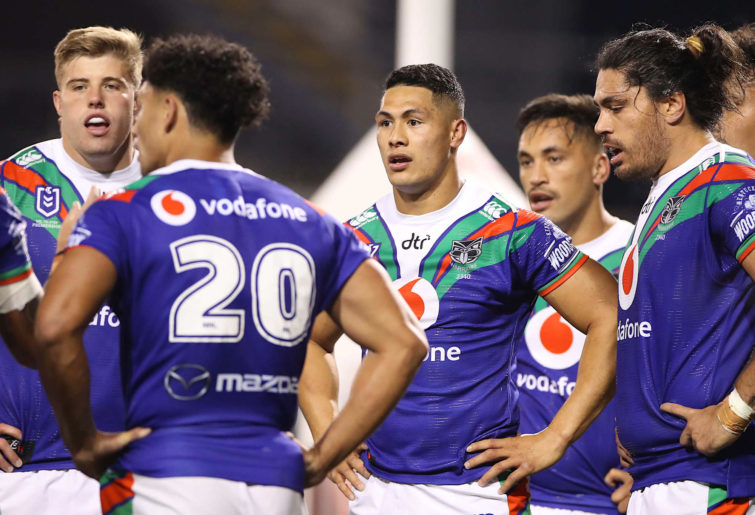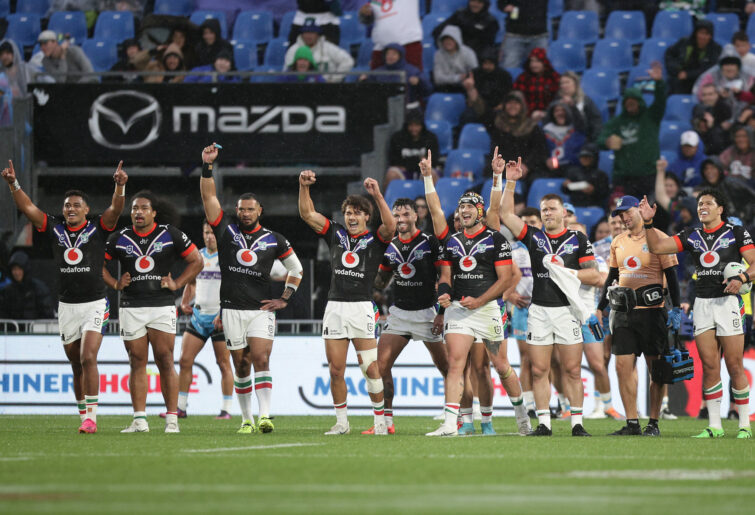If there was any club in world sport that has done it tough over the past three years, it was the New Zealand Warriors in Australia’s National Rugby League competition.
On March 14, 2020, New Zealand Prime Minister Jacinda Ardern made the snap decision to close New Zealand’s borders in response to the growing COVID-19 threat, after the disease was declared a pandemic just three days earlier.
At the time that the announcement was made, the Warriors were already in Australia preparing to play a Round 1 match against the Newcastle Knights in Newcastle.
The timing couldn’t have been any worse – in the hours following the announcement of the country’s border closures, the club suffered a 20-0 loss to the Knights, after which their future in the NRL remained uncertain.
Suddenly locked out of their own country, the Warriors remained in Australia the following week and shifted camp to Kingscliff, where they would base themselves before playing their Round 2 match against the Canberra Raiders on the Gold Coast.
Their determination to keep the season going earned them the support and respect of the fans of other clubs, some of whom purchased a Warriors membership as a means of supporting the club that was about to remain stranded on this side of the Tasman for the foreseeable future.
The Warriors’ plight would get worse after the match against the Raiders; with the COVID-19 situation getting worse, and Queensland announcing it would close its domestic borders to the rest of Australia, the NRL season was then suspended.
This allowed the club to return home to New Zealand and isolate for a fortnight, as mandated by the country’s government, and at that stage it remained uncertain as to when and how the season would continue.
A week later, both Australia and New Zealand joined the rest of the world in lockdown, with nearly all sport shut down as the world grappled with the once-in-a-lifetime pandemic that has changed the way we live forever.
Not long after, talks began between NRL officials as to how to resume the season, as the COVID-19 spread began to slow in both countries, allowing for a staggered re-opening of the economy, dependent on the situation at the time.
Following the announcement that the season would resume on May 28, the Warriors were granted special permission by the Australian government to fly into the country, where they would isolate for a fortnight in Tamworth but still be allowed to train together.
They then relocated to the Central Coast and would make the local stadium their “home away from home” as they faced the reality that they would have to spend the remainder of the season in Australia.
Their first match since the season resumption saw them produce an efficient performance to beat the Dragons 18-0, in which they completed their first 44 sets before Jack Murchie dropped the ball in a tackle with less than five minutes remaining.
Another win followed when they beat the Cowboys by 37-26 at “home” in Round 5, but their already turbulent season would take another dramatic turn for the worse when head coach Stephen Kearney was suddenly given his marching orders the following week.
Assistant coach Todd Payten was immediately parachuted into the senior role on a caretaker basis and in his first match oversaw a 50-6 loss to the Melbourne Storm at Kogarah Oval, which was relocated from AAMI Park as the COVID-19 crisis started to escalate in Victoria.
It was after that match that Storm officials, including coach Craig Bellamy, captain Cameron Smith and assistant Ryan Hoffman visited the Warriors’ sheds and addressed the squad commending them for the way they went about their business in restarting the season.
Despite the hardships faced by many of the players in being away from loved ones for the entire season, the side would become competitive, winning six of their remaining thirteen matches to just miss out on the finals, finishing 10th on the ladder.
Their sacrifices in leaving loved ones behind for the purpose of restarting the season, and the way they conducted themselves in logistically challenging circumstances, saw the whole team awarded the Provan-Summons Medal (usually awarded to individuals) at the 2020 Dally M Awards.
Further, 2018 Dally M Medallist Roger Tuivasa-Sheck was named Dally M Captain of the Year, for his conduct both on and off the field.

Roger Tuivasa-Sheck (Photo by Mark Kolbe/Getty Images)
Their NRL Women’s side, which included winger Madison Bartlett who now plays for the Titans, could not be saved from the effects of COVID-19 though, forced to withdraw from the competition after 2020 with no timeframe set on when they will seek re-admission.
Payten was offered the full-time gig for the 2021 season but declined, instead heading north to Townsville to replace Paul Green as Cowboys coach.
Nathan Brown was then appointed as Warriors coach, and oversaw another logistically difficult season both on and off the field as they again spent the entire season camped in Australia, with no timeframe set on when New Zealand would reopen its borders to foreigners.
Again they spent the pre-season under quarantine conditions in Tamworth and again they would be based on the Central Coast for at least the first five rounds of the season.
But despite a border bubble being established between Australia and New Zealand, the club opted to spend the entire season on this side of the Tasman, knowing all too well that either country’s borders could slam shut again in the event of another COVID-19 outbreak.
During the season, the club unearthed young star Reece Walsh, who would have won the Dally M Rookie of the Year award if he hadn’t been suspended on two occasions, including one for being involved in a melee in their final match of the year.
Having been based on the Central Coast for the balance of the 2021 season, the Warriors along with all the other clubs were forced to relocate to Queensland when a COVID-19 outbreak smothered New South Wales, sending the state into a months-long lockdown.
They eventually finished 12th on the ladder – a drop of two places from the previous season – with eight wins from their twenty-four matches, but their largest win was by only 14 points against the wooden spooners, the Bulldogs.
When the draw for the 2022 season was released, there were high expectations for the Warriors to finally return home, such that the NRL fixtured them for a blockbuster homecoming against the reigning premiers, the Penrith Panthers.
However, despite the vaccination programs ramping up in both Australia and New Zealand in an attempt to put an end to the prolonged lockdowns, the risk was still too high and their homecoming was again delayed to the start of July.
In the intervention, the club based themselves in Redcliffe for the first half of the season and despite a promising start, including beating the Broncos and Cowboys in consecutive weeks, they would endure a prolonged period of poor form, suffering a record 70-10 loss to the Storm in round seven.

New Zealand Warriors (Photo by Dave Rowland/Getty Images)
Not long after, New Zealand started doing away with the border closures, opening its borders to fully vaccinated visitors, thus allowing the Warriors to finally return to their home country without having to isolate for a fortnight.
Coach Nathan Brown was relieved of his duties when he couldn’t commit to a full-time move across the ditch, leaving club legend Stacey Jones to take the reins for the rest of the season.
Their homecoming, which came over 1,000 days since their last true home game, was worth the wait as a sell-out crowd at Mount Smart Stadium saw the locals thrash the Wests Tigers by 22-2 in a clash of the two worst-performed sides of the season.
They would win one more match for the season, by 42-18 against the Bulldogs in round 22, to eventually finish second-last on the ladder, just ahead of the Tigers; it was the second consecutive year that their biggest win for the season was against the boys from Belmore.
Jones has completed his stint as caretaker coach, with Andrew Webster to take over as full-time coach in 2023.
He previously filled in as coach in between Jason Taylor’s sacking and Ivan Cleary’s appointment at the Wests Tigers in early 2017, and also filled in for Cleary at the Panthers earlier this season when he underwent knee surgery in May.
Already the cleaning out at the club has begun with Reece Walsh returning to the Brisbane Broncos, while Euan Aitken has signed with expansion club the Dolphins, who will be coached by Wayne Bennett in their inaugural season.
This came following the mid-season departures of Kodi Nikorima and Matthew Lodge to the Rabbitohs and Roosters respectively.
They have, however, signed the likes of Dylan Walker, Mitchell Barnett and Te Maire Martin, with the latter set to be given the task of filling the void left by Walsh at full-back.
There has been talk of all 16 other clubs taking their home games against the Warriors across the ditch, but that idea has been shelved, and it’s expected the Warriors will resume the regular ritual of flying back and forth every second week (or thereabouts) in 2023.
The club will play nine of its twelve home games at Mount Smart Stadium next year, with two to be played in Wellington (the opponents of which are still to be determined by the draw when it is released later this year) and one to be played as part of Magic Round in Brisbane.
And now, after possibly the most turbulent three years by any club in world team sport, some sense of normality should return to the New Zealand Warriors in 2023 and as such there will be no more excuses if the club continues to underperform going forward.
But despite their mostly poor results in the past three seasons, the club should be commended for the way they have gone about their business and conducted themselves while being locked out of their own country for most of that time period.






























































































